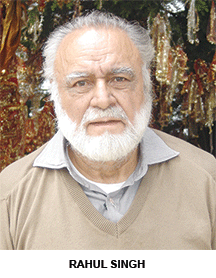No products in the cart.
Delhi University’s FYUP imbroglio
 – Rahul Singh is the former editor of Reader’s Digest and Indian Express
– Rahul Singh is the former editor of Reader’s Digest and Indian Express
NOBODY COMES OUT smelling roses in Delhi University’s four year undergraduate programme (FYUP) imbroglio, following which the programme — hastily introduced last year (2013) — has been reversed in the new academic year. Neither the previous Congress-led UPA-II government, nor its successor the BJP-led National Democratic Alliance (NDA), nor the bruised DU vice-chancellor Dinesh Singh, who should have resigned but hasn’t, and least of all the University Grants Commission (UGC).
All of them have lowered the prestige of what is arguably the best university in the country, even though it’s ranked a modest 441-500 in the annual World University Rankings of the London-based Quacquarelli Symonds. Together, these dramatis personae have inflicted grave damage upon DU’s 430,000 students (of whom 140,000 are full-time) and 9,000 faculty. The latter have been sacrificed on the altar of politics — the bane of Indian education, particularly higher education. Despite fancy talk about “autonomy” and “independent decision-making”, it’s now clear that the government in power calls all the shots in Indian education.
A good case can be made for the FYUP which Dinesh Singh introduced towards the end of the UPA-II government’s tenure. The FYUP initiative could have aligned undergraduate education in India with international norms and prompted a revolutionary change in higher education. The laudable intent of switching from the three-year undergraduate programme to four years was to deepen the college experience and make graduates more employable. With students in India entering college at a much younger age than before, FYUP would have produced more mature and employment-ready graduates.
I went up to Britain’s Cambridge University when I was 19 years old for a three-year undergraduate programme. Attending lectures was optional and students spent considerable time in the debating, film and photographic societies, to prepare for postgraduate vocations. The university authorities took it for granted that students were sufficiently mature to choose their own lifestyles. Their job was only to show the way. Therefore when we graduated we were mature and ready for working life.
An estimated 12 million usually too-young Indians enter the job market every year, some highly educated, but most with dubious qualifications. As EducationWorld has highlighted (EW July), a Nasscom-McKinsey World Institute Study (2005) showed that 75 percent of engineering and 85 percent of arts, science and commerce graduates, are not fit for employment in multinational companies. The unemployability of graduates and youth in general is one of the major challenges confronting the nation. Frustrated young educated men and women without work, and little or no prospect of it, constitute a combustible mix attracted to crime and extremist ideologies of various hues. Work, especially if it’s fulfilling and adequately remunerative, is the best antidote to civil unrest and violence.
Delhi University’s FYUP had another purpose, which was perhaps its hidden agenda. It was to make the varsity financially less dependent on government. Indian universities are heavily subsidised by government and the fees students pay are ridiculously low, even in prestigious colleges such as St. Stephen’s and Miranda House. On the other hand, in foreign universities such as Harvard, Yale, Oxford and Cambridge, students without scholarships have to pay huge amounts for undergraduate education.
Post-independence India’s heavily subsidised higher education system permits and encourages government control of the academy. Whether it’s Congress or BJP, no political party is in favour of academic autonomy, since it will lose patronage and influence, including the power to appoint vice chancellors and heads of education institutions. Many of these appointments are patently undeserving with the main criterion for selection being subservience.
The irony of this imbroglio is that vice chancellor dinesh Singh is an admirer of Narendra Modi’s vision of skills development. Moreover, FYUP was soundly conceptualised and flexible — students could exit the course after two years with a diploma, after three years with a degree, and after four years with a specialised honours degree.
But although well-conceived, hasty implementation of FYUP put up the backs of many teachers, student unions and associations. Because of insufficient notice and debate, there were rumours of outsourcing, higher tuition fees, and subsidy cuts which finally torpedoed the programme.
In all, this volte-face of UGC — the higher education watchdog and major funder of universities — is shameful, indicative of how slavishly subservient it is to whichever government is in power. When it was introduced in 2013, the UGC chairman praised FYUP, and even persuaded the then Union HRD minister to support it. But under prompting from the newly elected NDA government, he issued a stern note, ordering DU to scrap it!
This sorry episode quite clearly demonstrates that higher education must be pulled out from the dead hand of government. If this means a degree of privatisation and outsourcing, as well as higher fees, it’s the lesser evil.





 – Rahul Singh is the former editor of Reader’s Digest and Indian Express
– Rahul Singh is the former editor of Reader’s Digest and Indian Express








Add comment